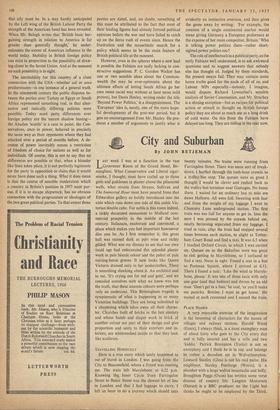City and Suburban
By JOHN BETJ EMAN LAST week I was at a function in the vast Grosvenor Room of the Grand Hotel, Bir- mingham. What Conservative and Liberal cigar- smoke, I thought, must have curled up to those gods and goddesses in plaster above the pilastered walls, what strains from Strauss, Sullivan and The Immortal Hour must have poured from that Edwardian gallery so boldly introduced into the aisle which runs down one side of this noble Vic- torian double cube. For noble is this room indeed, a richly decorated monument to Midland com- mercial prosperity in the middle of the last century. Italianate, exuberant and convinced, a place which makes you feel important howsoever dim you be. As I first remember it, this great hall was stained dark as port wine and richly gilded. What was my dismay to see that our own timid age had redecorated this splendid plaster work in pale biscuit colour and the palest of pale nursing-home greens. It now looks like Queen Victoria dressed only in her underclothes. There is something shocking about it. An architect said to me, 'It's crying out for red and gold,' and we consoled ourselves with what we knew was not the truth, that these anaemic colours were perhaps only an undercoat. This Birmingham tragedy is symptomatic of what is happening to so many Victorian buildings. They are being submitted to a chastening which takes away all their charac- ter. Churches built of bricks in the last century and whose bands and diaper work in brick of another colour are part of their design and give proportion and unity to their exteriors and in- teriors, are whitewashed inside so that they look like sculleries.
TRAVELLING HOPEFULLY Here is a true story which lately happened to me of travel in London. I was going from the City to Beaconsfield, where a friend was meeting me. The train left Marylebone at 6.22 p.m. Knowing the Inner Circle from Farringdon Street to Baker Street was the slowest bit of line in London and that I had luggage to carry, I left an hour to do a journey which should take twenty minutes. No trains were running from Farringdon Street. There was some sort of break- down. I hurtled through the rush-hour crowds to a trolley-bus stop. The queues were so great I thought I would be clever and rushed back to the trolley-bus terminus near Gamages. No buses there. I waited for an ordinary bus to take me down Holborn. All were full. Sweating with fear and from the weight of my luggage I went to Chancery Lane underground station. The first train was too full for anyone to get in. Into the next I was pressed by the crowds behind me, nearly becoming separated from my luggage. I tried in vain, after the train had stopped several times between each station, to alight at Totten- ham Court Road and find a taxi. It was 6.5 when I reached Oxford Circus, to which I was carried on. Queues on to the Bakerloo were too great to risk getting to Marylebone, so I surfaced to find a taxi. None in sight. Found a seat in a bus to Portman Square, where I arrived at 6.15. There I found a taxi : 'Like the wind to Maryle- bone, please.' It was one of those taxis with only one gear (and that bottom) and driven by an old man. 'Don't get in a fuss,' he said, 'or you'll make me panicky. Besides I want to get home.' He waited at each crossroad and I missed the train.
PLACE NAMES A very enjoyable exercise of the imagination is the inventing of characters for the names of villages and railway stations. Harold Wood (Essex), I always think, is a most exemplary man of about forty who goes to the City every day and is fully insured and has a wife and two kiddiz.' Patrick Brompton (Yorks) is not so exemplary and I think he is in rep. and belongs to rather a decadent set in Wolverhampton. Leonard Stanley (Glos) is not his real name. His neighbour, Stanley Pontlarge (Worts), is a plumber with a large walrus moustache and belly. Broughton Poggs (Oxon) has written some verse dramas of country life. Langton Matravers (Dorset) is a BBC producer on the Light but thinks he ought to be employed by the Third.


































 Previous page
Previous page